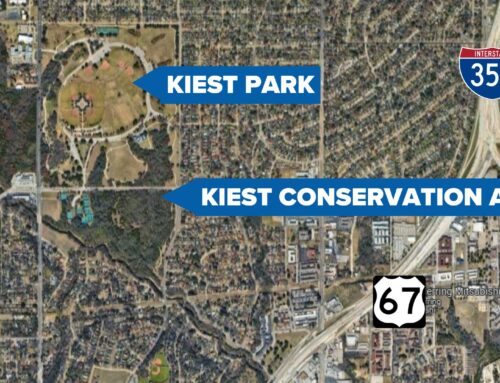Imagine a car with 100,000 miles on it.
You know it’s going to need something expensive soon: a timing belt, suspension maybe.
It’s worth getting some of those things checked out and replaced before she breaks down and leaves you stranded on Woodall Rogers.
“We’ve been running this grid like it’s a Toyota Camry with 250,000 miles on it, except no one has bothered to do that maintenance,” says Chrysta Castañeda, an oil-and-gas lawyer who lives in Kessler Park.
Castañeda has been advocating for a systematic overhaul of the Texas power grid and how it’s regulated.
She ran as a Democrat for Texas Railroad Commission in 2020. Her campaign raised $3.7 million, most of it from former New York City Mayor Michael Bloomberg and environmental groups. But her Republican opponent, Jim Wright, whose major donors are oil-and-gas companies, won the election with far less cash.
The “railroad commission” has nothing to do with trains; it’s charged with regulating the oil and gas industry in Texas and consists of three at-large commissioners.
Castañeda’s campaign called for a crackdown on “flaring,” burning off natural gas that energy producers can’t use, which is illegal but widely tolerated in Texas. We should be investing in systems to reuse that resource to sustain the power grid instead of allowing it to go to waste, she says.
A study from the University of Texas published in July concluded that the February blackout affected more customers and caused more damage than any other natural disaster in Texas history and offers key findings to what caused the grid to fail.
On her 2020 campaign
From all things by which you measure a campaign, short of actually winning the general election, it was a very successful campaign. We attracted a lot of attention, a lot of followers, a lot of donations. But the Democrats obviously didn’t win election to any statewide offices, which has been true for the last 30 years. I had hoped that we were closer than we were. But every year, we seem to get closer.
What the legislature did to fix the grid
Very little. It’s been a lot of window dressing on the real problem. And it would require big legislation to really fix these problems. We’ll see if they get away with it, but I think by and large, because we do not have highly contested elections, more purple areas of the state, there’s no real incentive for those legislators who feel like they’re protected in their jobs to actually reach a compromise and try to solve these problems.
A plan for the energy grid
We need something called the Texas Energy Commission, which has oversight of the grid and energy production and delivery in the state of Texas. It takes the view of not only where we are and what to fix now but planning for energy delivery in 2030 and 2040 so that we really start to think about everything from energy extraction on one end to delivery to our houses at the other end, and where our energy is going to come from. One thing I don’t think gets talked about enough is the explosive growth in our population centers and the increased demand that comes from that. And we should talk about geolocating distribution and supply closer to where the demand is.
A lack of regulation
The ERCOT system is not really a regulated system. There is a regulation component to it, but by and large, they’ve tried to get the free market to supply the incentives to generate, streamline and distribute power, and drive consumer choice to a price-point that’s lower than average in the United States. But we are an “energy-only” market, which means that we only pay for the energy that’s delivered. There’s no component in what we pay for electricity that incentivizes people to build new plants or backup generation, so we’re constantly operating on that edge of being undersupplied just as a result of the way the entire system is set up.
A market-based system
The market is supposed to be providing the necessary inputs to make it all work, but frequently the hands of the regulators are forced to come in and fix things even under the current system, so it’s not completely a free-market system. And the hands of the regulators don’t extend to what they really need to be able to do to ensure reliability of the Electric Reliability Council of Texas.
In February, the state’s power grid was minutes from long-term failure
We were 4 minutes and 37 seconds away from failing without the ability to restart it for months or longer. Without delving too much into the technical details: supply and demand on the electricity system basically always have to equal each other. And if they don’t equal each other, then the grid gets out of frequency. And when it gets out of frequency, the equipment at these plants that generate our electricity flip offline. It’s like a fuse blowing in your house … like plugging in one too many appliances and shorting out your system. We were four minutes away from that happening in February, and if it happens, you’re having to do in months what I’m talking about needing to do programmatically over a course of years.
The UT report found that key sites went offline because natural gas and electricity facilities rely on one another for generation, to put it simply, creating a chain of failures
The solution for that would be to have micro generation facilities based on the flared gas. We just light on fire enough natural gas to power all of the homes in Texas all the time. So if you turned that gas into electricity at the well sites where it’s being produced, then they would have enough electricity to drive all of that equipment themselves. There are a few more things they need to do, like winterize, but they at least would be self-sufficient on their power needs if we would just require the railroad commission to make them stop flaring and incentivize them to make their own power generation units out of that flared gas.
Planning is expensive
There’s a lot of poor planning and refusing to enforce laws that are already on the books both at the railroad commission and at ERCOT, because people seem to have the ability to complain to somebody in government and get excepted from following the law. There is a lot of money involved, yes. All of these issues come with an economic cost, and in Texas, that economic cost seems to get elevated over other priorities.
What she wishes more people knew about the Texas Railroad Commission
Its No. 1 job is to protect against the waste of our natural resources. All Texans have an interest that oil and gas are produced in an environmentally sound way and not wasted, and that’s what the railroad commission is supposed to be shepherding. That’s its job. Its job is not to make oil-and-gas operators happy; it’s to protect the integrity of our natural environment.
What she wishes more people knew about ERCOT
The way it’s set up, we are not paying for reliability the way that you and I would think, “Let’s make sure the air conditioner is running and has been serviced,” because we don’t want it to go out on a 100-degree day and be out for a week in the middle of summer. We make those decisions for ourselves that way, but no one is making decisions for our electric grid that way because no one has the power to require it.
Personal sustainability
Think about how you can reduce your demand, including if you are able to get an 18 or 20 SEER air-conditioning unit that runs so much more efficiently. If you are able to put solar on your roof and a battery pack in your garage to where you can generate your own electricity some days and store it in case there’s another outage, do that. I challenge city council people who have some control … for example, the conservation district that exists (in Kessler Park), you cannot put solar on the roof if it’s visible from the street. I’m not sure that’s a good idea.
What she found difficult about politics
The incredible divide, the schism between people I was capable of reaching and the rest of Texas who was listening to a completely different message. We really do live in two different Texas-es, and I don’t know how we solve that.
Read Chrysta Castañeda’s op-eds at castaneda-firm.com.
Interview has been edited for clarity and brevity.






